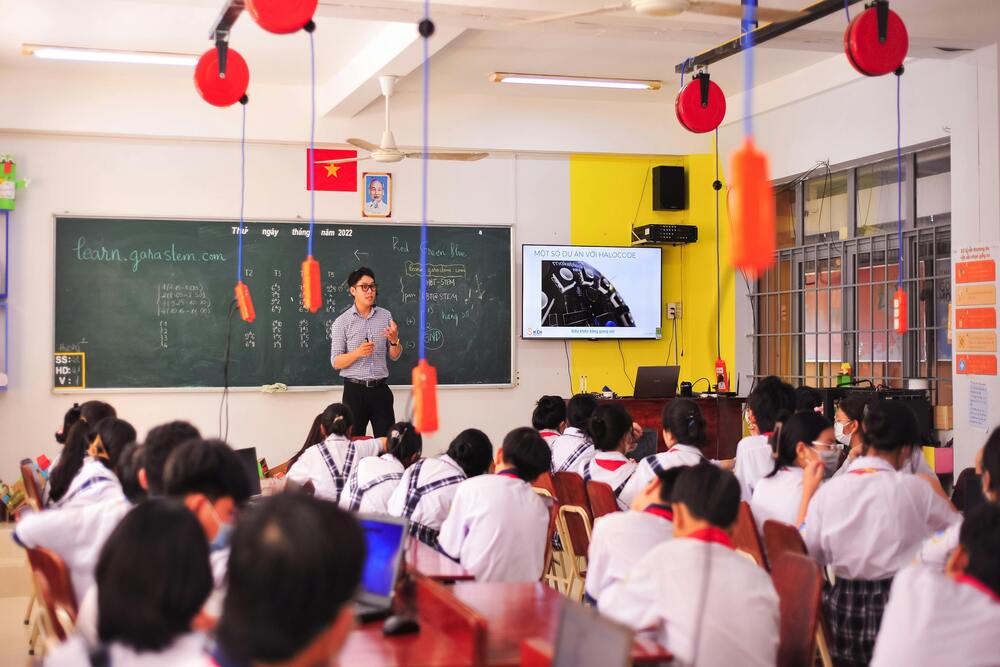
How Education Translation Is Transforming E-Learning in Vietnam
As Vietnam rides the wave of the digital revolution, e-learning has become a cornerstone of its educational transformation. Education translation ranks among the most powerful yet less documented drivers of this revolution. From bridging language gaps to supporting government initiatives, education translation in Vietnam is revolutionizing how students learn, absorb, and apply knowledge in the 21st century.
The Rise of E-Learning in Vietnam
Vietnam is experiencing a dynamic digital revolution, with education at its core. In recent years, the country has made remarkable progress in integrating technology into education. Factors like increased internet penetration, widespread smartphone usage, and supportive government policies have created an ideal environment for e-learning to flourish.
The COVID-19 pandemic accelerated this digital shift. As schools and universities temporarily closed, educators and students swiftly transitioned to digital platforms. This was not merely a short-term solution—it has evolved into a permanent approach.
Government Support and Strategic Vision
Recognizing e-learning’s potential to expand access and quality, the Vietnamese government has invested heavily in online education. Collaborations with international organizations have brought global best practices and technology into Vietnam’s education system.
These initiatives are yielding results. From urban centers like Ho Chi Minh City and Hanoi to remote rural areas, the number of students accessing digital content through online portals, mobile applications, and virtual classrooms is growing.
Education Translation: Facilitating Accessible Learning
Education translation is the bridge between technology and true accessibility. By translating and adapting online content into Vietnamese—and, where needed, minority languages—educators ensure that all learners, regardless of their linguistic background, can fully engage with educational content.
High-quality education translation goes beyond words, incorporating culturalization, contextual appropriateness, and educational sensitivity. It helps learners grasp not just the language but also the intent and context of the lesson.
From digital textbooks and e-learning modules to video lectures and quizzes, translated content delivers high-quality education to students across Vietnam, paving the way for improved and inclusive learning outcomes.
Read also: Discover the Best Free Book Apps to Access Thousands of Books
Why Education Translation Matters in Vietnam

As Vietnam’s e-learning ecosystem expands, the need for translation becomes critical to ensure no learner is left behind.
A Multilingual Nation with Diverse Learning Needs
While Vietnamese is the national and primary instructional language, it is not the mother tongue for many students, particularly those in rural, mountainous, or marginalized areas. Vietnam’s cultural richness brings linguistic diversity, which can create barriers in education when materials are available only in standard Vietnamese or foreign languages like English. This language gap impacts comprehension, participation, and academic achievement.
Education translation addresses this challenge by providing culturally adapted content. It includes examples, metaphors, and illustrations relevant to students’ local contexts, making learning more relatable. When students access materials in their native language, they are more likely to stay engaged, learn effectively, and develop a lifelong love of learning. This approach fosters inclusivity, valuing students’ linguistic and cultural identities within the national education system.
Bridging the Global and the Local
Vietnam’s embrace of e-learning means students are increasingly accessing materials from global platforms, MOOCs, and resources developed in English-speaking countries. While this global resource pool is vast, it remains inaccessible to many Vietnamese students without accurate translation and localization.
Education translation transforms this process by:
- Cultural Localization: Aligning examples, case studies, and references to be culturally relevant for Vietnamese students.
- Educational Relevance: Adapting teaching approaches and explanations to align with Vietnam’s national curriculum and standards.
- Clarity and Engagement: Ensuring translated materials are clear, age-appropriate, and engaging for diverse learners.
For example, an economics lesson referencing Wall Street might be adapted to include examples from Ho Chi Minh City or Da Nang. Similarly, science or history content could incorporate Vietnamese case studies to enhance relevance. This localization helps students connect with content meaningfully, leading to deeper understanding and retention, and enabling them to apply knowledge in real-world contexts.
Impacts of Education Translation Across Industries
From elementary schools to vocational training, education translation fosters inclusivity, effectiveness, and progress. Here’s how it impacts various sectors:
K-12 Education
In Vietnam’s K-12 system, accessible and understandable content is critical, especially for young learners still developing language skills. For ethnic minority or non-Vietnamese-speaking students, learning in a foreign language presents a dual challenge.
Education translation overcomes this by providing digital textbooks, e-learning modules, animated videos, and quizzes in native languages or simplified Vietnamese. During the COVID-19 pandemic, when remote learning became essential, translated content ensured children in urban and rural areas could continue their education with minimal disruption.
Higher Education and Academic Research
Vietnamese universities and research institutions are increasingly globalized. Access to international scholarly literature and collaboration is vital for competitiveness, but much of this content is in English. Education translation bridges this gap by translating academic articles, scientific databases, and research studies into Vietnamese, enabling deeper engagement. Conversely, translating Vietnamese scholarship into English enhances global visibility and intellectual discourse.
Vocational Training and Workforce Upskilling
In Vietnam’s dynamic labor market, upskilling and vocational training are key to competitiveness. With growing demand for flexible, skills-focused online platforms in industries like IT, finance, hospitality, manufacturing, and healthcare, education translation ensures accessibility. By translating course content, certifications, video training, and tutorials into Vietnamese, workers from diverse backgrounds—especially rural laborers, mid-career professionals, and older individuals—can acquire new skills, boosting employability and supporting lifelong learning.
Propelling Growth in Vietnam’s EdTech Market

Vietnam’s edtech sector is thriving, driven by rising digital literacy, smartphone adoption, and demand for accessible learning. With learning apps, online classrooms, and AI-based tutoring platforms, Vietnamese edtech startups are expanding domestically and across Southeast Asia.
Education translation is a key driver, enabling platforms to offer bilingual, culturally appropriate content that transforms the learning experience and opens new growth opportunities.
Meeting the Needs of a Multicultural User Base
Edtech platforms serve diverse users, from K-12 students to professionals and adult learners. A one-size-fits-all language strategy is ineffective. Education translation allows platforms to tailor content, user interfaces, sign-up processes, and customer support to Vietnam’s linguistic communities, ensuring clarity and inclusivity, especially for minority languages and regional dialects.
Gaining a Competitive Edge with Localization
In Vietnam’s competitive edtech market, localization is a key differentiator. Beyond translation, localization aligns content with local culture, customs, and learning expectations, enhancing learner satisfaction, engagement, and retention. It also builds trust by demonstrating a platform’s commitment to users’ needs. For edtech companies eyeing expansion into ASEAN markets like Laos, Cambodia, Thailand, or Indonesia, localization expertise provides a strategic advantage.
Read also: Tackling Multiple Dialects and Pluricentric Languages in Indonesian Game Localization
Challenges and Opportunities Ahead
Education translation in Vietnam offers clear benefits—digital inclusivity and alignment with national goals—but also faces challenges. Success depends on strategic approaches, investment, and innovation.
Key Challenges in Education Translation
Quality Assurance
Ensuring translation quality is critical. Inaccurate or contextually inappropriate translations can mislead students or misrepresent information, especially in science, health, or technical subjects. Schools and edtech providers must invest in experienced linguists, native speakers, and subject-matter experts to maintain accuracy.
Cost Constraints
High-quality translation services are costly, limiting access for smaller schools, rural initiatives, or grassroots NGOs. Collaborative translation databases, government funding, or nonprofit partnerships can help ensure inclusivity for underserved groups.
Scalability
As Vietnam’s e-learning market grows, scalable translation services are essential. Manually translating thousands of lessons, subtitles, or modules into multiple languages is impractical. Technology-based solutions like AI-driven translation software, Translation Management Systems (TMS), and blended AI-human models can balance speed, accuracy, and cultural sensitivity.
Turning Challenges into Opportunities
These challenges present opportunities for innovation:
- Startups can develop affordable, multilingual edtech platforms.
- Universities can offer translation and localization courses to meet workforce demand.
- NGOs and government ministries can create open-source translation repositories.
- Tech firms can enhance machine translation for Vietnamese grammar, tone, and syntax.
As Vietnam’s education systems and digital infrastructure advance, education translation will become more scalable, affordable, and accessible, supporting equity, innovation, and competitiveness.
Final Thoughts: A Future Built on Understanding
Education translation in Vietnam is doing more than just converting text from one language to another—it’s reshaping access to knowledge, uplifting marginalized communities, and equipping learners with the tools they need to thrive in a globalized world. Whether it’s a child in the northern highlands, a university student in Ho Chi Minh City, or a vocational learner in the Mekong Delta, translated content ensures that no one is left behind in the pursuit of knowledge.
By making educational content accessible, relevant, and inclusive, education translation is building a foundation for a future where learning is not limited by language. It supports national development, closes learning gaps, and brings Vietnam closer to its vision of inclusive, lifelong education for all.
At Digital-Trans Asia, we believe in the power of language to transform lives, businesses, and communities. While we don’t specialize exclusively in education translation, we do provide high-quality translation and localization services across various sectors—backed by a deep understanding of Southeast Asian markets and cultural nuances.
Whether you're an edtech startup, a content creator, or a business looking to expand in Vietnam or beyond, we can help you communicate with clarity and impact. Need guidance on reaching multilingual audiences? Looking for culturally resonant localization strategies? Let’s talk. Contact us today and let’s explore how language can take your ideas further.